Report: Financial Performance & HR in Hospitality Business Toolkit
VerifiedAdded on 2022/12/28
|15
|3950
|352
Report
AI Summary
This report analyzes the financial and human resource management practices within the hospitality industry, using Four Seasons Hotel as a case study. It begins with an introduction to the hospitality business and then delves into financial performance, covering principles like recording transactions, the double-entry system, risk and return, financial management techniques, performance measurement, and diversification. The report demonstrates the use of journals, ledgers, and trial balances for financial data recording. It also examines the HR life cycle, including strategy, job design, planning, attraction, recruitment, selection, induction, training, rewards, career management, and separation. Furthermore, it outlines performance management plans, detailing the setting of performance standards, communication, measurement, comparison, result discussions, and corrective actions. The report also touches upon special legislation and the impact of employment and contract law on hospitality organizations' decision-making processes. Finally, the report concludes with a summary of the key findings.
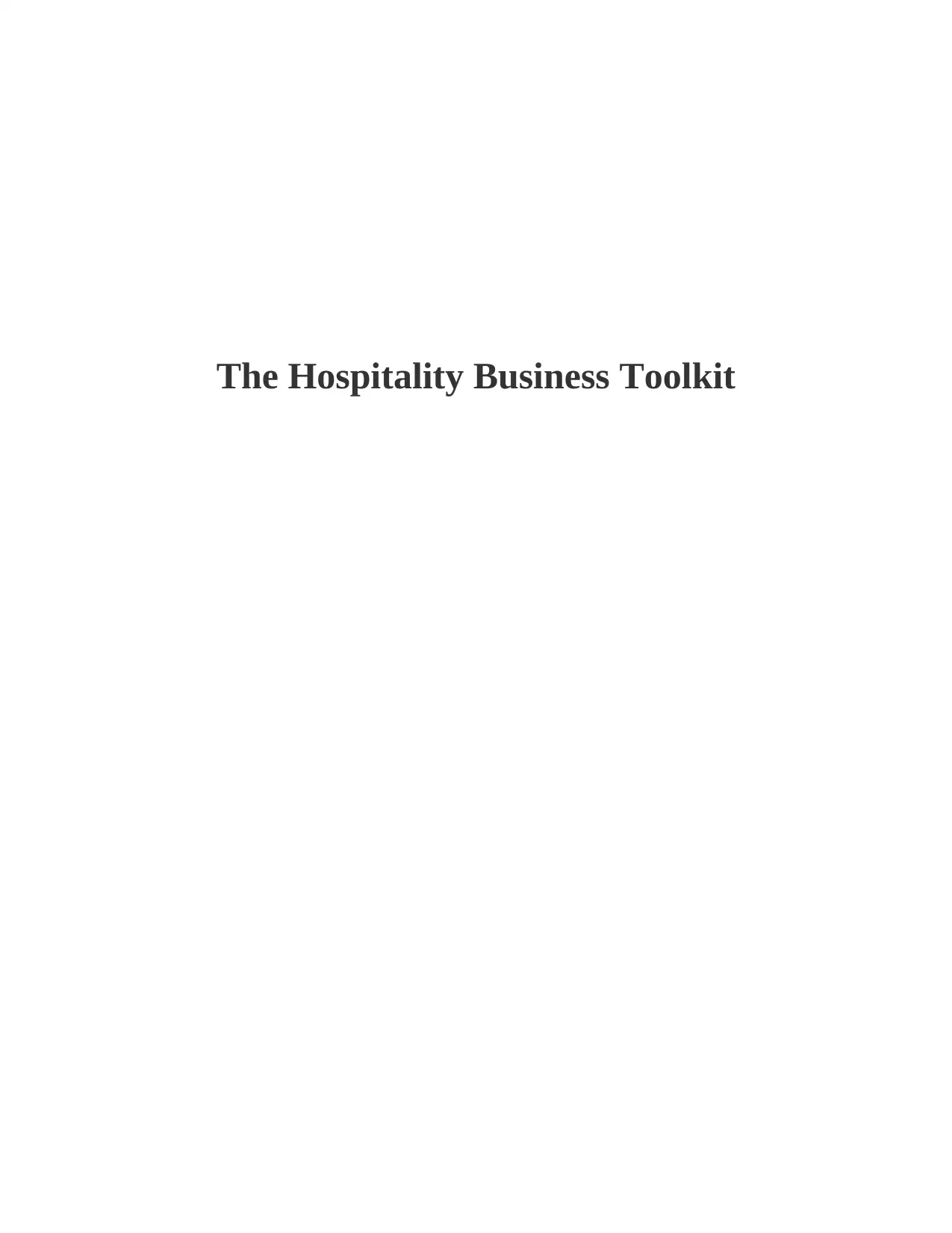
The Hospitality Business Toolkit
Paraphrase This Document
Need a fresh take? Get an instant paraphrase of this document with our AI Paraphraser
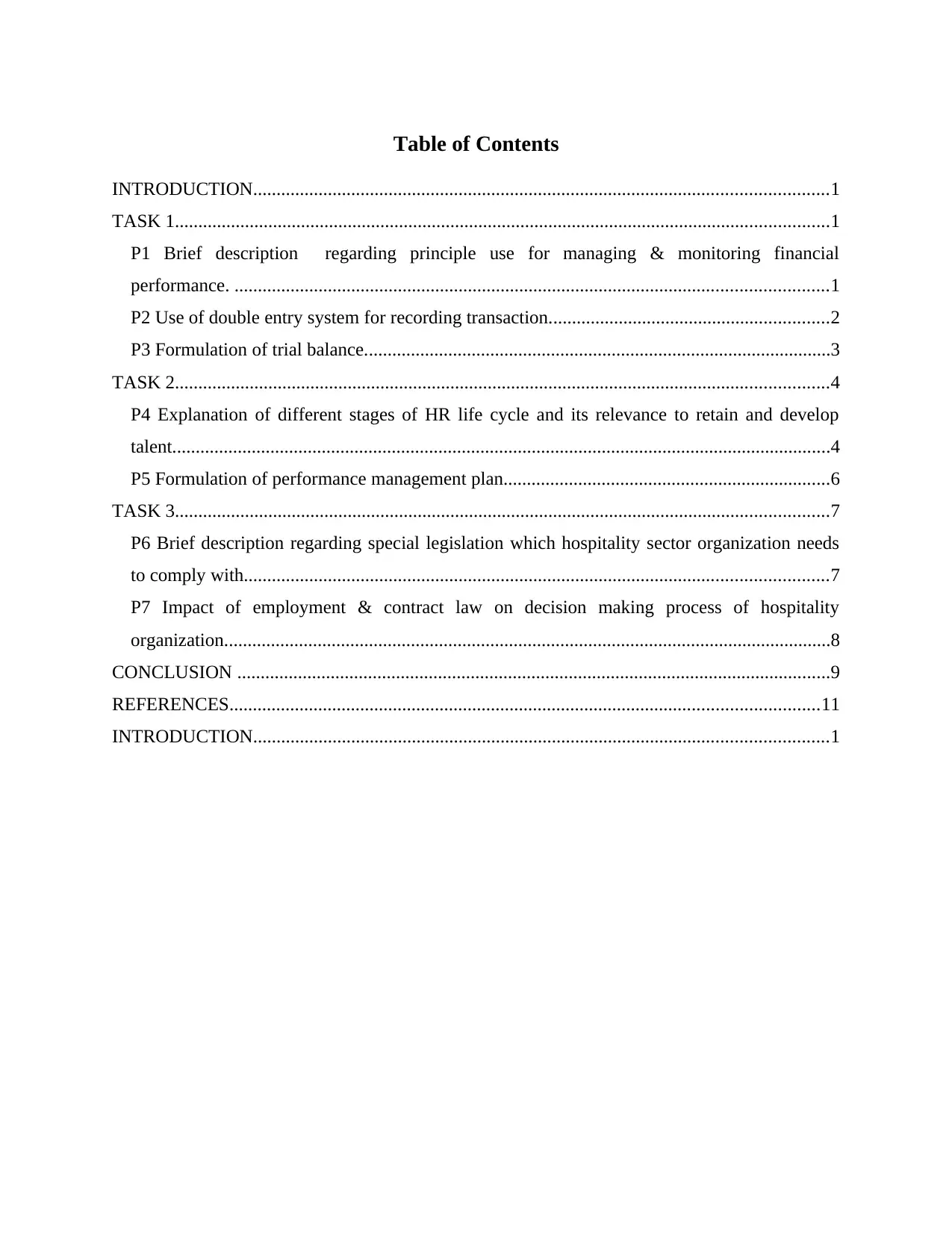
Table of Contents
INTRODUCTION...........................................................................................................................1
TASK 1............................................................................................................................................1
P1 Brief description regarding principle use for managing & monitoring financial
performance. ...............................................................................................................................1
P2 Use of double entry system for recording transaction............................................................2
P3 Formulation of trial balance....................................................................................................3
TASK 2............................................................................................................................................4
P4 Explanation of different stages of HR life cycle and its relevance to retain and develop
talent.............................................................................................................................................4
P5 Formulation of performance management plan......................................................................6
TASK 3............................................................................................................................................7
P6 Brief description regarding special legislation which hospitality sector organization needs
to comply with.............................................................................................................................7
P7 Impact of employment & contract law on decision making process of hospitality
organization..................................................................................................................................8
CONCLUSION ...............................................................................................................................9
REFERENCES..............................................................................................................................11
INTRODUCTION...........................................................................................................................1
INTRODUCTION...........................................................................................................................1
TASK 1............................................................................................................................................1
P1 Brief description regarding principle use for managing & monitoring financial
performance. ...............................................................................................................................1
P2 Use of double entry system for recording transaction............................................................2
P3 Formulation of trial balance....................................................................................................3
TASK 2............................................................................................................................................4
P4 Explanation of different stages of HR life cycle and its relevance to retain and develop
talent.............................................................................................................................................4
P5 Formulation of performance management plan......................................................................6
TASK 3............................................................................................................................................7
P6 Brief description regarding special legislation which hospitality sector organization needs
to comply with.............................................................................................................................7
P7 Impact of employment & contract law on decision making process of hospitality
organization..................................................................................................................................8
CONCLUSION ...............................................................................................................................9
REFERENCES..............................................................................................................................11
INTRODUCTION...........................................................................................................................1
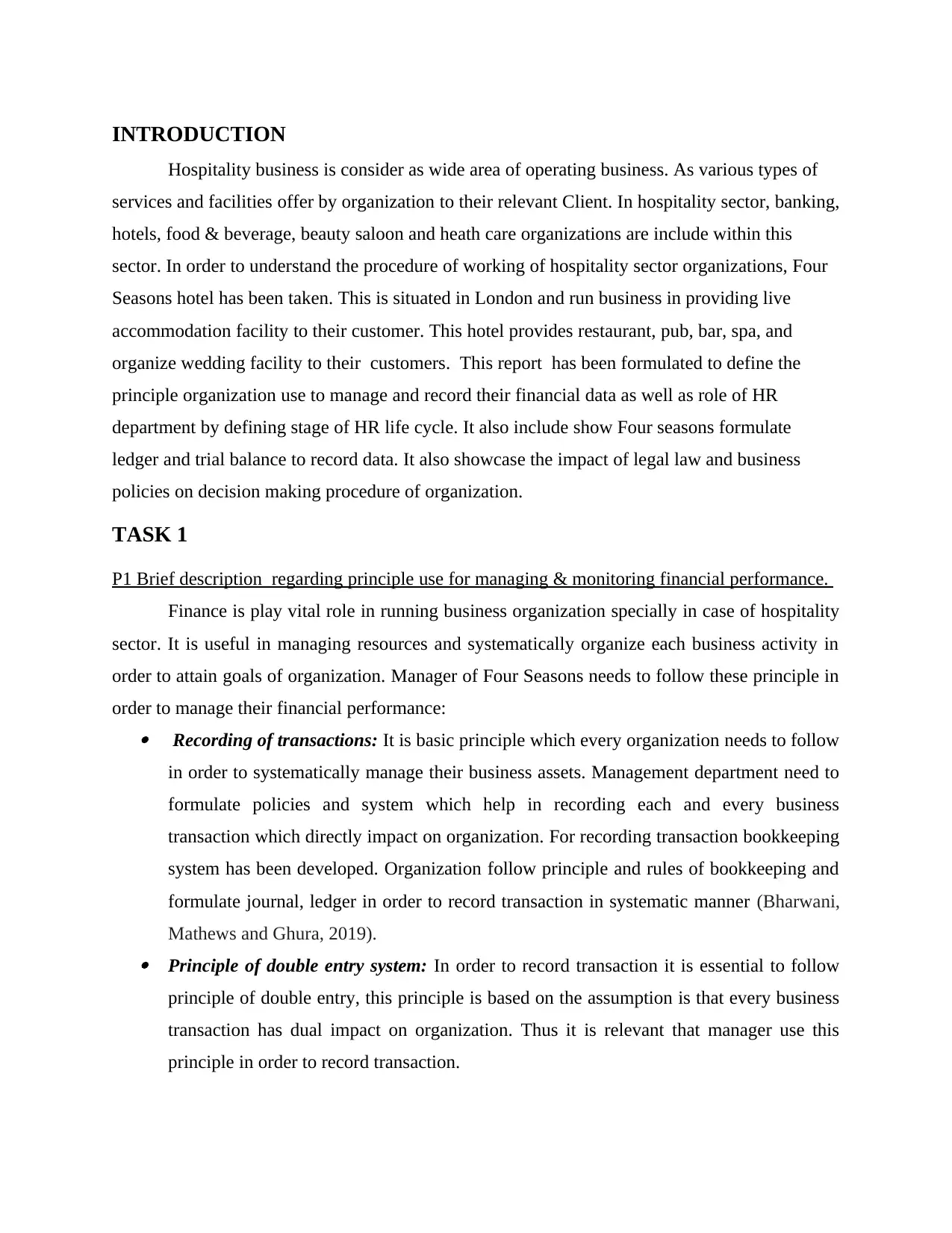
INTRODUCTION
Hospitality business is consider as wide area of operating business. As various types of
services and facilities offer by organization to their relevant Client. In hospitality sector, banking,
hotels, food & beverage, beauty saloon and heath care organizations are include within this
sector. In order to understand the procedure of working of hospitality sector organizations, Four
Seasons hotel has been taken. This is situated in London and run business in providing live
accommodation facility to their customer. This hotel provides restaurant, pub, bar, spa, and
organize wedding facility to their customers. This report has been formulated to define the
principle organization use to manage and record their financial data as well as role of HR
department by defining stage of HR life cycle. It also include show Four seasons formulate
ledger and trial balance to record data. It also showcase the impact of legal law and business
policies on decision making procedure of organization.
TASK 1
P1 Brief description regarding principle use for managing & monitoring financial performance.
Finance is play vital role in running business organization specially in case of hospitality
sector. It is useful in managing resources and systematically organize each business activity in
order to attain goals of organization. Manager of Four Seasons needs to follow these principle in
order to manage their financial performance: Recording of transactions: It is basic principle which every organization needs to follow
in order to systematically manage their business assets. Management department need to
formulate policies and system which help in recording each and every business
transaction which directly impact on organization. For recording transaction bookkeeping
system has been developed. Organization follow principle and rules of bookkeeping and
formulate journal, ledger in order to record transaction in systematic manner (Bharwani,
Mathews and Ghura, 2019). Principle of double entry system: In order to record transaction it is essential to follow
principle of double entry, this principle is based on the assumption is that every business
transaction has dual impact on organization. Thus it is relevant that manager use this
principle in order to record transaction.
Hospitality business is consider as wide area of operating business. As various types of
services and facilities offer by organization to their relevant Client. In hospitality sector, banking,
hotels, food & beverage, beauty saloon and heath care organizations are include within this
sector. In order to understand the procedure of working of hospitality sector organizations, Four
Seasons hotel has been taken. This is situated in London and run business in providing live
accommodation facility to their customer. This hotel provides restaurant, pub, bar, spa, and
organize wedding facility to their customers. This report has been formulated to define the
principle organization use to manage and record their financial data as well as role of HR
department by defining stage of HR life cycle. It also include show Four seasons formulate
ledger and trial balance to record data. It also showcase the impact of legal law and business
policies on decision making procedure of organization.
TASK 1
P1 Brief description regarding principle use for managing & monitoring financial performance.
Finance is play vital role in running business organization specially in case of hospitality
sector. It is useful in managing resources and systematically organize each business activity in
order to attain goals of organization. Manager of Four Seasons needs to follow these principle in
order to manage their financial performance: Recording of transactions: It is basic principle which every organization needs to follow
in order to systematically manage their business assets. Management department need to
formulate policies and system which help in recording each and every business
transaction which directly impact on organization. For recording transaction bookkeeping
system has been developed. Organization follow principle and rules of bookkeeping and
formulate journal, ledger in order to record transaction in systematic manner (Bharwani,
Mathews and Ghura, 2019). Principle of double entry system: In order to record transaction it is essential to follow
principle of double entry, this principle is based on the assumption is that every business
transaction has dual impact on organization. Thus it is relevant that manager use this
principle in order to record transaction.
⊘ This is a preview!⊘
Do you want full access?
Subscribe today to unlock all pages.

Trusted by 1+ million students worldwide
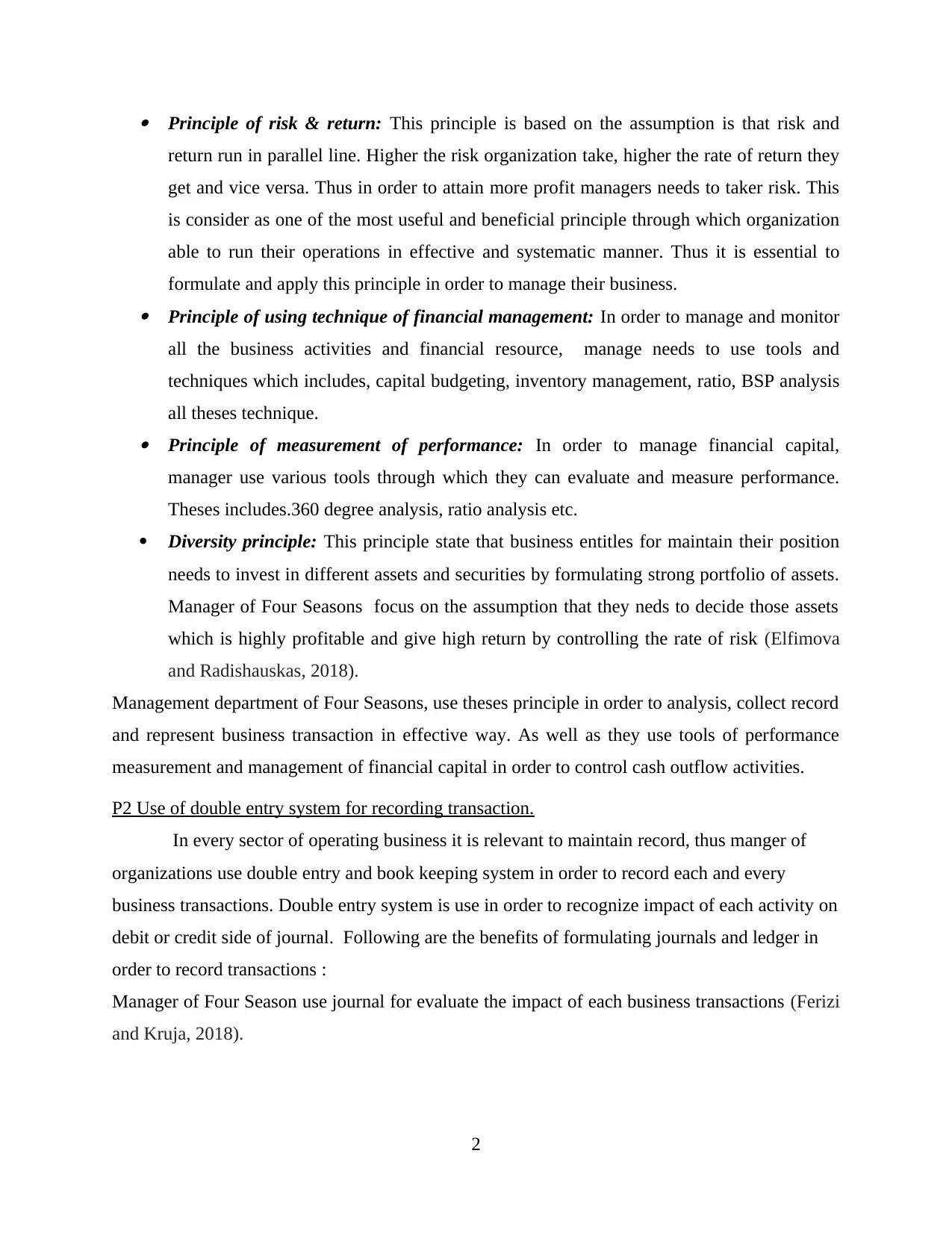
Principle of risk & return: This principle is based on the assumption is that risk and
return run in parallel line. Higher the risk organization take, higher the rate of return they
get and vice versa. Thus in order to attain more profit managers needs to taker risk. This
is consider as one of the most useful and beneficial principle through which organization
able to run their operations in effective and systematic manner. Thus it is essential to
formulate and apply this principle in order to manage their business. Principle of using technique of financial management: In order to manage and monitor
all the business activities and financial resource, manage needs to use tools and
techniques which includes, capital budgeting, inventory management, ratio, BSP analysis
all theses technique. Principle of measurement of performance: In order to manage financial capital,
manager use various tools through which they can evaluate and measure performance.
Theses includes.360 degree analysis, ratio analysis etc.
Diversity principle: This principle state that business entitles for maintain their position
needs to invest in different assets and securities by formulating strong portfolio of assets.
Manager of Four Seasons focus on the assumption that they neds to decide those assets
which is highly profitable and give high return by controlling the rate of risk (Elfimova
and Radishauskas, 2018).
Management department of Four Seasons, use theses principle in order to analysis, collect record
and represent business transaction in effective way. As well as they use tools of performance
measurement and management of financial capital in order to control cash outflow activities.
P2 Use of double entry system for recording transaction.
In every sector of operating business it is relevant to maintain record, thus manger of
organizations use double entry and book keeping system in order to record each and every
business transactions. Double entry system is use in order to recognize impact of each activity on
debit or credit side of journal. Following are the benefits of formulating journals and ledger in
order to record transactions :
Manager of Four Season use journal for evaluate the impact of each business transactions (Ferizi
and Kruja, 2018).
2
return run in parallel line. Higher the risk organization take, higher the rate of return they
get and vice versa. Thus in order to attain more profit managers needs to taker risk. This
is consider as one of the most useful and beneficial principle through which organization
able to run their operations in effective and systematic manner. Thus it is essential to
formulate and apply this principle in order to manage their business. Principle of using technique of financial management: In order to manage and monitor
all the business activities and financial resource, manage needs to use tools and
techniques which includes, capital budgeting, inventory management, ratio, BSP analysis
all theses technique. Principle of measurement of performance: In order to manage financial capital,
manager use various tools through which they can evaluate and measure performance.
Theses includes.360 degree analysis, ratio analysis etc.
Diversity principle: This principle state that business entitles for maintain their position
needs to invest in different assets and securities by formulating strong portfolio of assets.
Manager of Four Seasons focus on the assumption that they neds to decide those assets
which is highly profitable and give high return by controlling the rate of risk (Elfimova
and Radishauskas, 2018).
Management department of Four Seasons, use theses principle in order to analysis, collect record
and represent business transaction in effective way. As well as they use tools of performance
measurement and management of financial capital in order to control cash outflow activities.
P2 Use of double entry system for recording transaction.
In every sector of operating business it is relevant to maintain record, thus manger of
organizations use double entry and book keeping system in order to record each and every
business transactions. Double entry system is use in order to recognize impact of each activity on
debit or credit side of journal. Following are the benefits of formulating journals and ledger in
order to record transactions :
Manager of Four Season use journal for evaluate the impact of each business transactions (Ferizi
and Kruja, 2018).
2
Paraphrase This Document
Need a fresh take? Get an instant paraphrase of this document with our AI Paraphraser
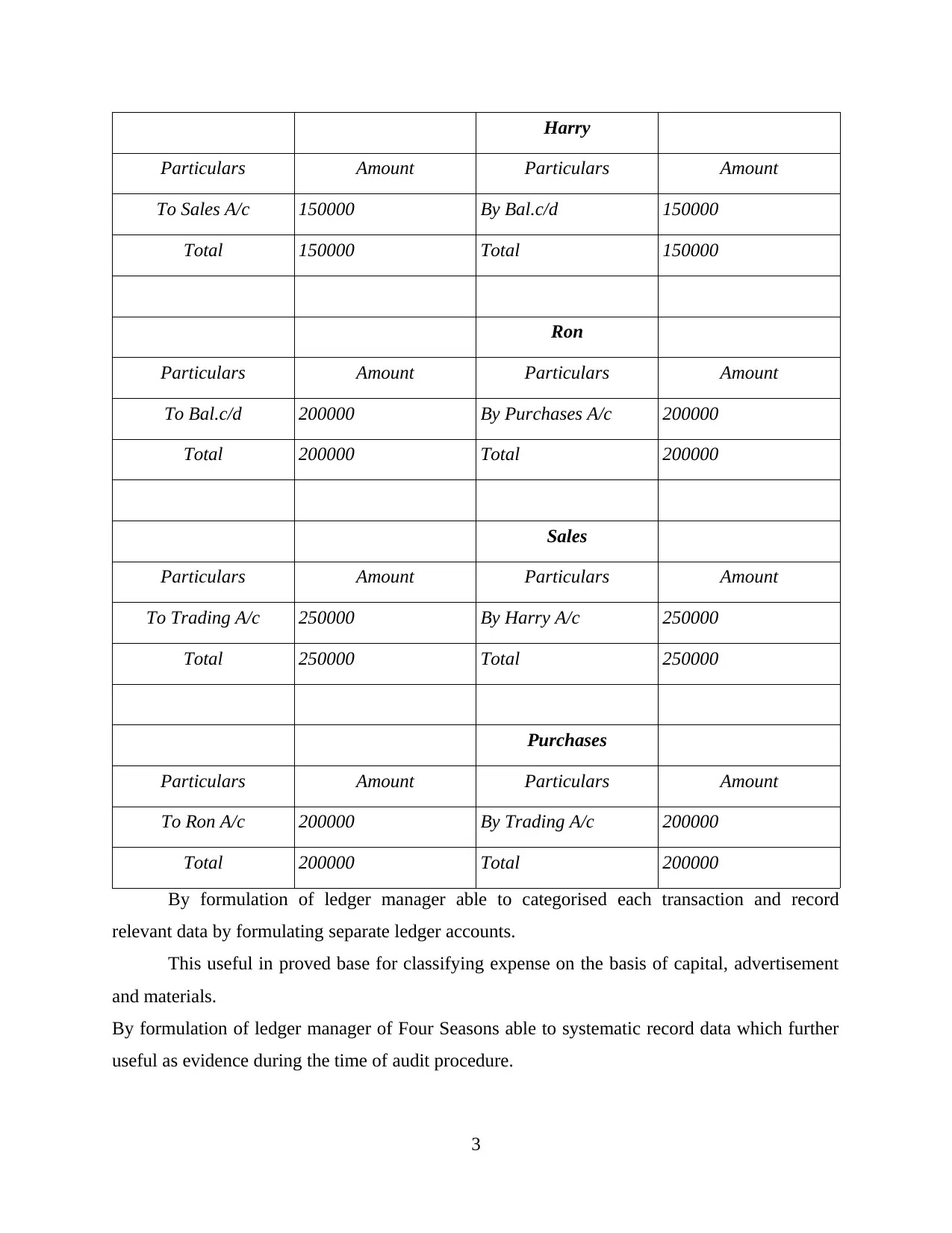
Harry
Particulars Amount Particulars Amount
To Sales A/c 150000 By Bal.c/d 150000
Total 150000 Total 150000
Ron
Particulars Amount Particulars Amount
To Bal.c/d 200000 By Purchases A/c 200000
Total 200000 Total 200000
Sales
Particulars Amount Particulars Amount
To Trading A/c 250000 By Harry A/c 250000
Total 250000 Total 250000
Purchases
Particulars Amount Particulars Amount
To Ron A/c 200000 By Trading A/c 200000
Total 200000 Total 200000
By formulation of ledger manager able to categorised each transaction and record
relevant data by formulating separate ledger accounts.
This useful in proved base for classifying expense on the basis of capital, advertisement
and materials.
By formulation of ledger manager of Four Seasons able to systematic record data which further
useful as evidence during the time of audit procedure.
3
Particulars Amount Particulars Amount
To Sales A/c 150000 By Bal.c/d 150000
Total 150000 Total 150000
Ron
Particulars Amount Particulars Amount
To Bal.c/d 200000 By Purchases A/c 200000
Total 200000 Total 200000
Sales
Particulars Amount Particulars Amount
To Trading A/c 250000 By Harry A/c 250000
Total 250000 Total 250000
Purchases
Particulars Amount Particulars Amount
To Ron A/c 200000 By Trading A/c 200000
Total 200000 Total 200000
By formulation of ledger manager able to categorised each transaction and record
relevant data by formulating separate ledger accounts.
This useful in proved base for classifying expense on the basis of capital, advertisement
and materials.
By formulation of ledger manager of Four Seasons able to systematic record data which further
useful as evidence during the time of audit procedure.
3
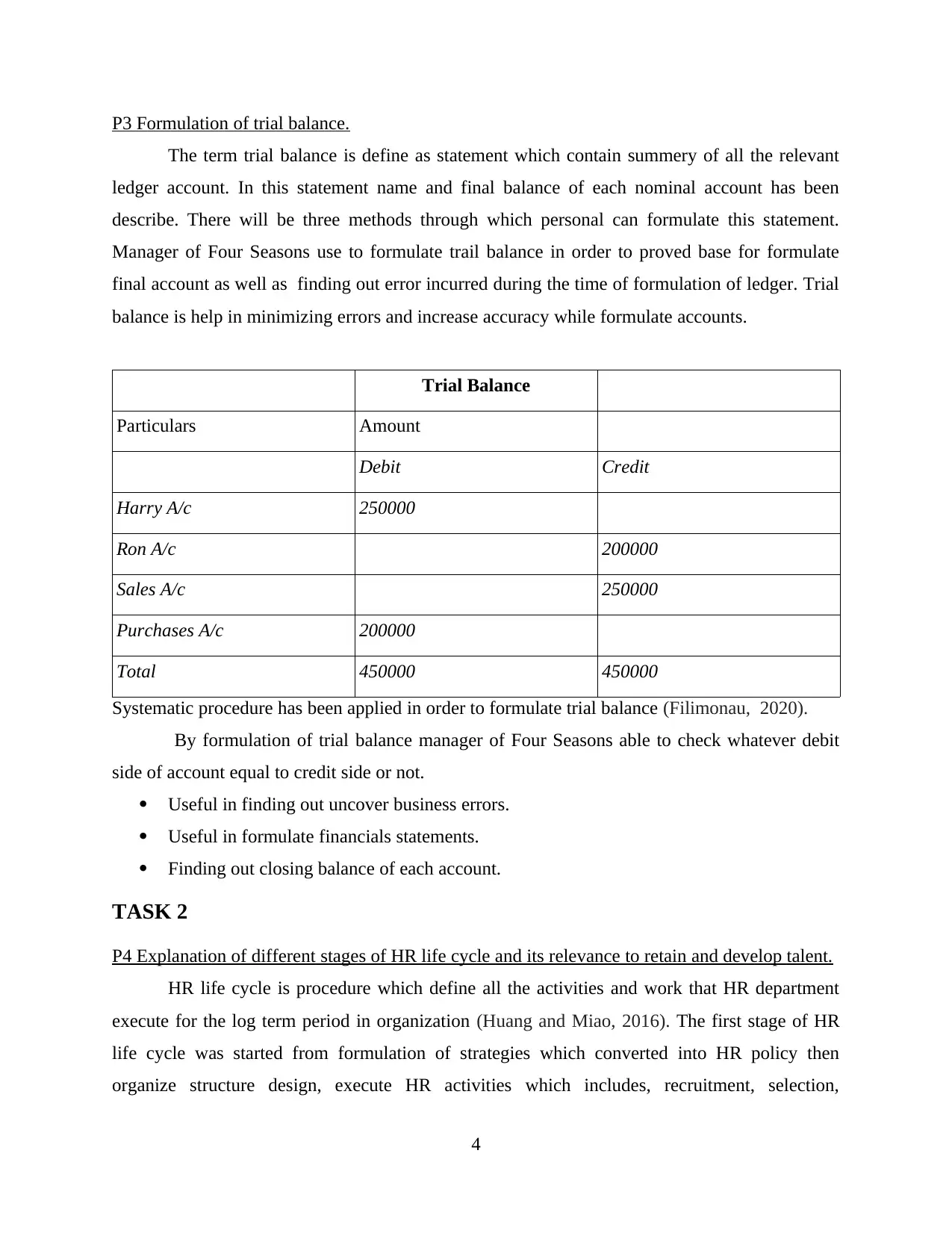
P3 Formulation of trial balance.
The term trial balance is define as statement which contain summery of all the relevant
ledger account. In this statement name and final balance of each nominal account has been
describe. There will be three methods through which personal can formulate this statement.
Manager of Four Seasons use to formulate trail balance in order to proved base for formulate
final account as well as finding out error incurred during the time of formulation of ledger. Trial
balance is help in minimizing errors and increase accuracy while formulate accounts.
Trial Balance
Particulars Amount
Debit Credit
Harry A/c 250000
Ron A/c 200000
Sales A/c 250000
Purchases A/c 200000
Total 450000 450000
Systematic procedure has been applied in order to formulate trial balance (Filimonau, 2020).
By formulation of trial balance manager of Four Seasons able to check whatever debit
side of account equal to credit side or not.
Useful in finding out uncover business errors.
Useful in formulate financials statements.
Finding out closing balance of each account.
TASK 2
P4 Explanation of different stages of HR life cycle and its relevance to retain and develop talent.
HR life cycle is procedure which define all the activities and work that HR department
execute for the log term period in organization (Huang and Miao, 2016). The first stage of HR
life cycle was started from formulation of strategies which converted into HR policy then
organize structure design, execute HR activities which includes, recruitment, selection,
4
The term trial balance is define as statement which contain summery of all the relevant
ledger account. In this statement name and final balance of each nominal account has been
describe. There will be three methods through which personal can formulate this statement.
Manager of Four Seasons use to formulate trail balance in order to proved base for formulate
final account as well as finding out error incurred during the time of formulation of ledger. Trial
balance is help in minimizing errors and increase accuracy while formulate accounts.
Trial Balance
Particulars Amount
Debit Credit
Harry A/c 250000
Ron A/c 200000
Sales A/c 250000
Purchases A/c 200000
Total 450000 450000
Systematic procedure has been applied in order to formulate trial balance (Filimonau, 2020).
By formulation of trial balance manager of Four Seasons able to check whatever debit
side of account equal to credit side or not.
Useful in finding out uncover business errors.
Useful in formulate financials statements.
Finding out closing balance of each account.
TASK 2
P4 Explanation of different stages of HR life cycle and its relevance to retain and develop talent.
HR life cycle is procedure which define all the activities and work that HR department
execute for the log term period in organization (Huang and Miao, 2016). The first stage of HR
life cycle was started from formulation of strategies which converted into HR policy then
organize structure design, execute HR activities which includes, recruitment, selection,
4
⊘ This is a preview!⊘
Do you want full access?
Subscribe today to unlock all pages.

Trusted by 1+ million students worldwide
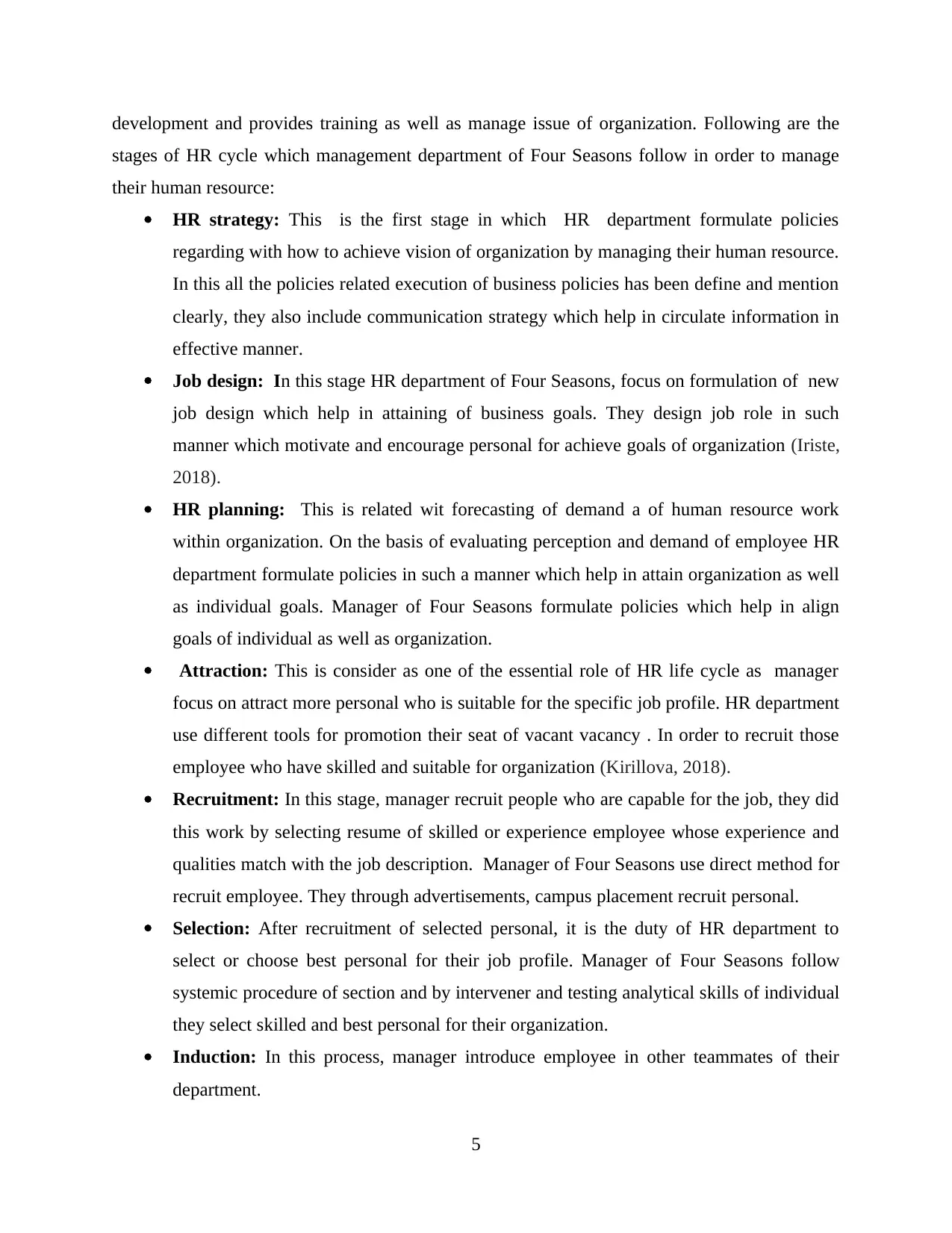
development and provides training as well as manage issue of organization. Following are the
stages of HR cycle which management department of Four Seasons follow in order to manage
their human resource:
HR strategy: This is the first stage in which HR department formulate policies
regarding with how to achieve vision of organization by managing their human resource.
In this all the policies related execution of business policies has been define and mention
clearly, they also include communication strategy which help in circulate information in
effective manner.
Job design: In this stage HR department of Four Seasons, focus on formulation of new
job design which help in attaining of business goals. They design job role in such
manner which motivate and encourage personal for achieve goals of organization (Iriste,
2018).
HR planning: This is related wit forecasting of demand a of human resource work
within organization. On the basis of evaluating perception and demand of employee HR
department formulate policies in such a manner which help in attain organization as well
as individual goals. Manager of Four Seasons formulate policies which help in align
goals of individual as well as organization.
Attraction: This is consider as one of the essential role of HR life cycle as manager
focus on attract more personal who is suitable for the specific job profile. HR department
use different tools for promotion their seat of vacant vacancy . In order to recruit those
employee who have skilled and suitable for organization (Kirillova, 2018).
Recruitment: In this stage, manager recruit people who are capable for the job, they did
this work by selecting resume of skilled or experience employee whose experience and
qualities match with the job description. Manager of Four Seasons use direct method for
recruit employee. They through advertisements, campus placement recruit personal.
Selection: After recruitment of selected personal, it is the duty of HR department to
select or choose best personal for their job profile. Manager of Four Seasons follow
systemic procedure of section and by intervener and testing analytical skills of individual
they select skilled and best personal for their organization.
Induction: In this process, manager introduce employee in other teammates of their
department.
5
stages of HR cycle which management department of Four Seasons follow in order to manage
their human resource:
HR strategy: This is the first stage in which HR department formulate policies
regarding with how to achieve vision of organization by managing their human resource.
In this all the policies related execution of business policies has been define and mention
clearly, they also include communication strategy which help in circulate information in
effective manner.
Job design: In this stage HR department of Four Seasons, focus on formulation of new
job design which help in attaining of business goals. They design job role in such
manner which motivate and encourage personal for achieve goals of organization (Iriste,
2018).
HR planning: This is related wit forecasting of demand a of human resource work
within organization. On the basis of evaluating perception and demand of employee HR
department formulate policies in such a manner which help in attain organization as well
as individual goals. Manager of Four Seasons formulate policies which help in align
goals of individual as well as organization.
Attraction: This is consider as one of the essential role of HR life cycle as manager
focus on attract more personal who is suitable for the specific job profile. HR department
use different tools for promotion their seat of vacant vacancy . In order to recruit those
employee who have skilled and suitable for organization (Kirillova, 2018).
Recruitment: In this stage, manager recruit people who are capable for the job, they did
this work by selecting resume of skilled or experience employee whose experience and
qualities match with the job description. Manager of Four Seasons use direct method for
recruit employee. They through advertisements, campus placement recruit personal.
Selection: After recruitment of selected personal, it is the duty of HR department to
select or choose best personal for their job profile. Manager of Four Seasons follow
systemic procedure of section and by intervener and testing analytical skills of individual
they select skilled and best personal for their organization.
Induction: In this process, manager introduce employee in other teammates of their
department.
5
Paraphrase This Document
Need a fresh take? Get an instant paraphrase of this document with our AI Paraphraser
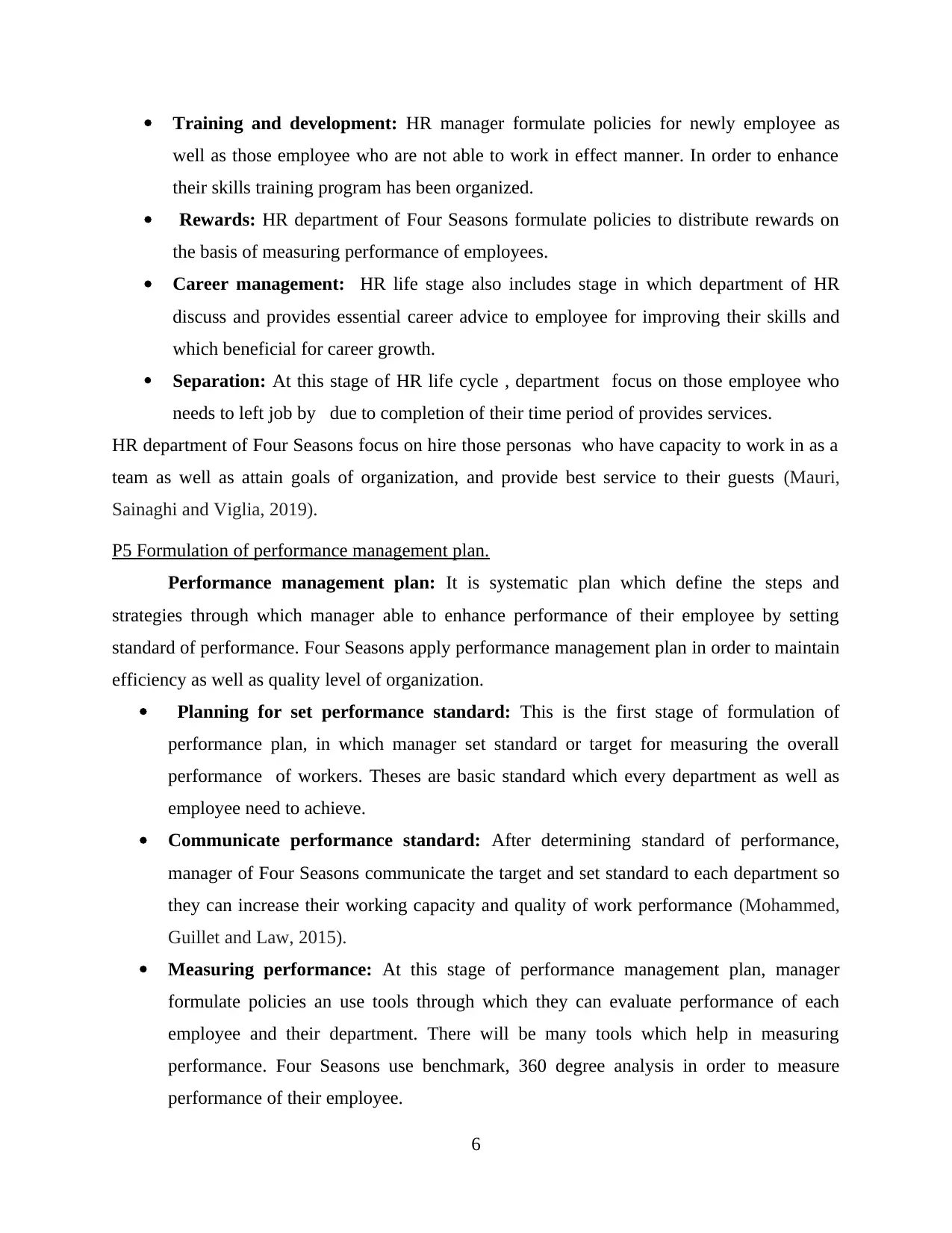
Training and development: HR manager formulate policies for newly employee as
well as those employee who are not able to work in effect manner. In order to enhance
their skills training program has been organized.
Rewards: HR department of Four Seasons formulate policies to distribute rewards on
the basis of measuring performance of employees.
Career management: HR life stage also includes stage in which department of HR
discuss and provides essential career advice to employee for improving their skills and
which beneficial for career growth.
Separation: At this stage of HR life cycle , department focus on those employee who
needs to left job by due to completion of their time period of provides services.
HR department of Four Seasons focus on hire those personas who have capacity to work in as a
team as well as attain goals of organization, and provide best service to their guests (Mauri,
Sainaghi and Viglia, 2019).
P5 Formulation of performance management plan.
Performance management plan: It is systematic plan which define the steps and
strategies through which manager able to enhance performance of their employee by setting
standard of performance. Four Seasons apply performance management plan in order to maintain
efficiency as well as quality level of organization.
Planning for set performance standard: This is the first stage of formulation of
performance plan, in which manager set standard or target for measuring the overall
performance of workers. Theses are basic standard which every department as well as
employee need to achieve.
Communicate performance standard: After determining standard of performance,
manager of Four Seasons communicate the target and set standard to each department so
they can increase their working capacity and quality of work performance (Mohammed,
Guillet and Law, 2015).
Measuring performance: At this stage of performance management plan, manager
formulate policies an use tools through which they can evaluate performance of each
employee and their department. There will be many tools which help in measuring
performance. Four Seasons use benchmark, 360 degree analysis in order to measure
performance of their employee.
6
well as those employee who are not able to work in effect manner. In order to enhance
their skills training program has been organized.
Rewards: HR department of Four Seasons formulate policies to distribute rewards on
the basis of measuring performance of employees.
Career management: HR life stage also includes stage in which department of HR
discuss and provides essential career advice to employee for improving their skills and
which beneficial for career growth.
Separation: At this stage of HR life cycle , department focus on those employee who
needs to left job by due to completion of their time period of provides services.
HR department of Four Seasons focus on hire those personas who have capacity to work in as a
team as well as attain goals of organization, and provide best service to their guests (Mauri,
Sainaghi and Viglia, 2019).
P5 Formulation of performance management plan.
Performance management plan: It is systematic plan which define the steps and
strategies through which manager able to enhance performance of their employee by setting
standard of performance. Four Seasons apply performance management plan in order to maintain
efficiency as well as quality level of organization.
Planning for set performance standard: This is the first stage of formulation of
performance plan, in which manager set standard or target for measuring the overall
performance of workers. Theses are basic standard which every department as well as
employee need to achieve.
Communicate performance standard: After determining standard of performance,
manager of Four Seasons communicate the target and set standard to each department so
they can increase their working capacity and quality of work performance (Mohammed,
Guillet and Law, 2015).
Measuring performance: At this stage of performance management plan, manager
formulate policies an use tools through which they can evaluate performance of each
employee and their department. There will be many tools which help in measuring
performance. Four Seasons use benchmark, 360 degree analysis in order to measure
performance of their employee.
6
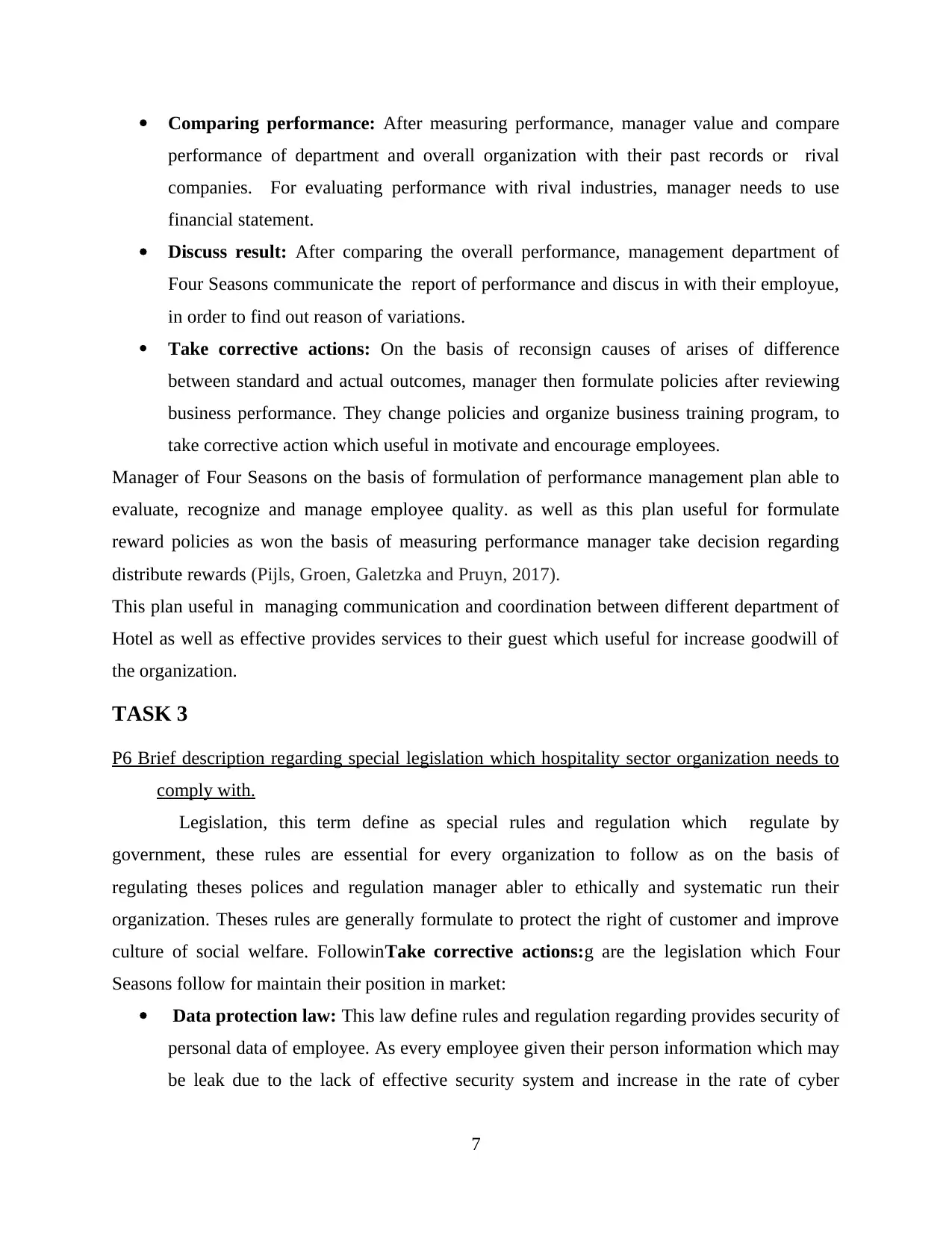
Comparing performance: After measuring performance, manager value and compare
performance of department and overall organization with their past records or rival
companies. For evaluating performance with rival industries, manager needs to use
financial statement.
Discuss result: After comparing the overall performance, management department of
Four Seasons communicate the report of performance and discus in with their employue,
in order to find out reason of variations.
Take corrective actions: On the basis of reconsign causes of arises of difference
between standard and actual outcomes, manager then formulate policies after reviewing
business performance. They change policies and organize business training program, to
take corrective action which useful in motivate and encourage employees.
Manager of Four Seasons on the basis of formulation of performance management plan able to
evaluate, recognize and manage employee quality. as well as this plan useful for formulate
reward policies as won the basis of measuring performance manager take decision regarding
distribute rewards (Pijls, Groen, Galetzka and Pruyn, 2017).
This plan useful in managing communication and coordination between different department of
Hotel as well as effective provides services to their guest which useful for increase goodwill of
the organization.
TASK 3
P6 Brief description regarding special legislation which hospitality sector organization needs to
comply with.
Legislation, this term define as special rules and regulation which regulate by
government, these rules are essential for every organization to follow as on the basis of
regulating theses polices and regulation manager abler to ethically and systematic run their
organization. Theses rules are generally formulate to protect the right of customer and improve
culture of social welfare. FollowinTake corrective actions:g are the legislation which Four
Seasons follow for maintain their position in market:
Data protection law: This law define rules and regulation regarding provides security of
personal data of employee. As every employee given their person information which may
be leak due to the lack of effective security system and increase in the rate of cyber
7
performance of department and overall organization with their past records or rival
companies. For evaluating performance with rival industries, manager needs to use
financial statement.
Discuss result: After comparing the overall performance, management department of
Four Seasons communicate the report of performance and discus in with their employue,
in order to find out reason of variations.
Take corrective actions: On the basis of reconsign causes of arises of difference
between standard and actual outcomes, manager then formulate policies after reviewing
business performance. They change policies and organize business training program, to
take corrective action which useful in motivate and encourage employees.
Manager of Four Seasons on the basis of formulation of performance management plan able to
evaluate, recognize and manage employee quality. as well as this plan useful for formulate
reward policies as won the basis of measuring performance manager take decision regarding
distribute rewards (Pijls, Groen, Galetzka and Pruyn, 2017).
This plan useful in managing communication and coordination between different department of
Hotel as well as effective provides services to their guest which useful for increase goodwill of
the organization.
TASK 3
P6 Brief description regarding special legislation which hospitality sector organization needs to
comply with.
Legislation, this term define as special rules and regulation which regulate by
government, these rules are essential for every organization to follow as on the basis of
regulating theses polices and regulation manager abler to ethically and systematic run their
organization. Theses rules are generally formulate to protect the right of customer and improve
culture of social welfare. FollowinTake corrective actions:g are the legislation which Four
Seasons follow for maintain their position in market:
Data protection law: This law define rules and regulation regarding provides security of
personal data of employee. As every employee given their person information which may
be leak due to the lack of effective security system and increase in the rate of cyber
7
⊘ This is a preview!⊘
Do you want full access?
Subscribe today to unlock all pages.

Trusted by 1+ million students worldwide
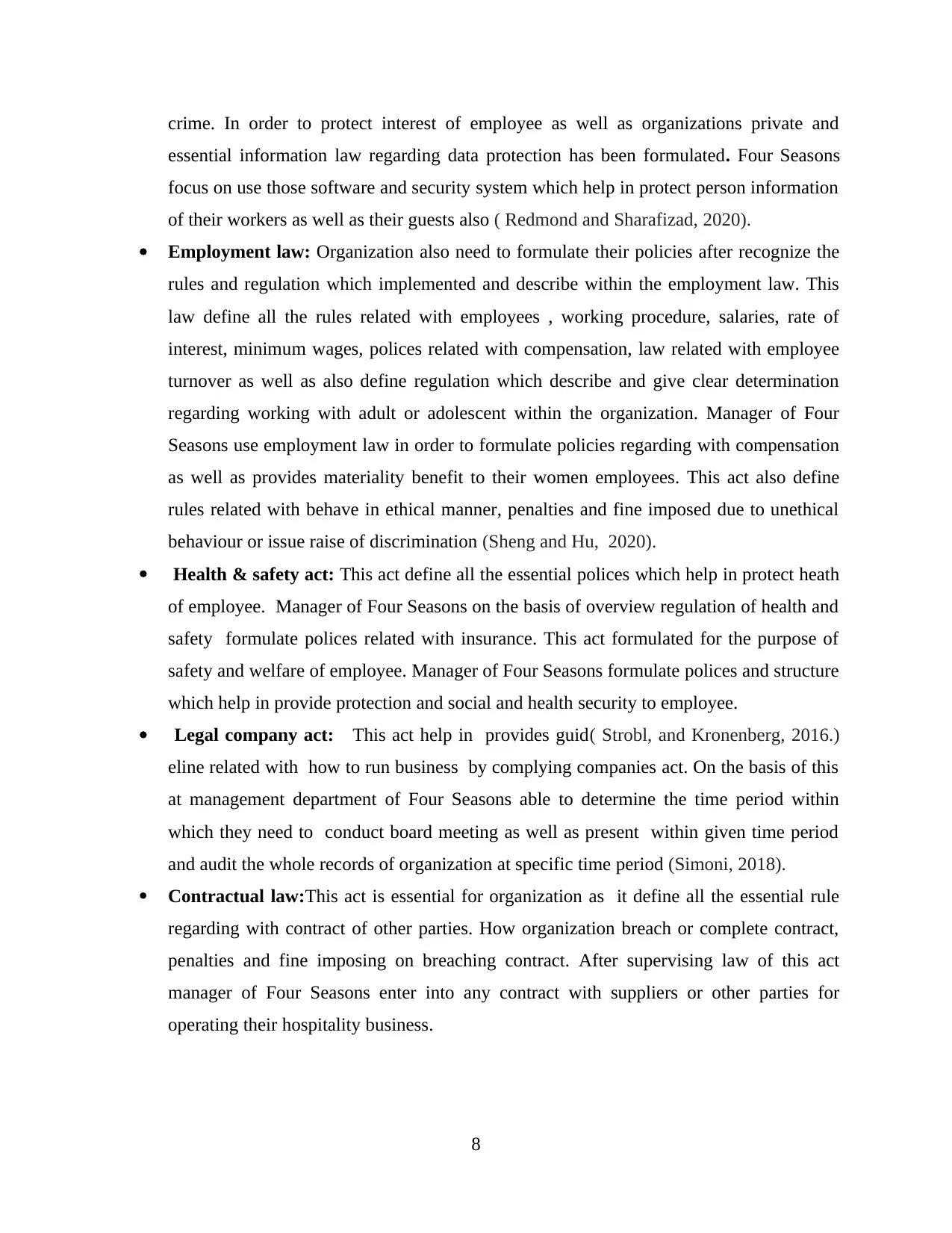
crime. In order to protect interest of employee as well as organizations private and
essential information law regarding data protection has been formulated. Four Seasons
focus on use those software and security system which help in protect person information
of their workers as well as their guests also ( Redmond and Sharafizad, 2020).
Employment law: Organization also need to formulate their policies after recognize the
rules and regulation which implemented and describe within the employment law. This
law define all the rules related with employees , working procedure, salaries, rate of
interest, minimum wages, polices related with compensation, law related with employee
turnover as well as also define regulation which describe and give clear determination
regarding working with adult or adolescent within the organization. Manager of Four
Seasons use employment law in order to formulate policies regarding with compensation
as well as provides materiality benefit to their women employees. This act also define
rules related with behave in ethical manner, penalties and fine imposed due to unethical
behaviour or issue raise of discrimination (Sheng and Hu, 2020).
Health & safety act: This act define all the essential polices which help in protect heath
of employee. Manager of Four Seasons on the basis of overview regulation of health and
safety formulate polices related with insurance. This act formulated for the purpose of
safety and welfare of employee. Manager of Four Seasons formulate polices and structure
which help in provide protection and social and health security to employee.
Legal company act: This act help in provides guid( Strobl, and Kronenberg, 2016.)
eline related with how to run business by complying companies act. On the basis of this
at management department of Four Seasons able to determine the time period within
which they need to conduct board meeting as well as present within given time period
and audit the whole records of organization at specific time period (Simoni, 2018).
Contractual law:This act is essential for organization as it define all the essential rule
regarding with contract of other parties. How organization breach or complete contract,
penalties and fine imposing on breaching contract. After supervising law of this act
manager of Four Seasons enter into any contract with suppliers or other parties for
operating their hospitality business.
8
essential information law regarding data protection has been formulated. Four Seasons
focus on use those software and security system which help in protect person information
of their workers as well as their guests also ( Redmond and Sharafizad, 2020).
Employment law: Organization also need to formulate their policies after recognize the
rules and regulation which implemented and describe within the employment law. This
law define all the rules related with employees , working procedure, salaries, rate of
interest, minimum wages, polices related with compensation, law related with employee
turnover as well as also define regulation which describe and give clear determination
regarding working with adult or adolescent within the organization. Manager of Four
Seasons use employment law in order to formulate policies regarding with compensation
as well as provides materiality benefit to their women employees. This act also define
rules related with behave in ethical manner, penalties and fine imposed due to unethical
behaviour or issue raise of discrimination (Sheng and Hu, 2020).
Health & safety act: This act define all the essential polices which help in protect heath
of employee. Manager of Four Seasons on the basis of overview regulation of health and
safety formulate polices related with insurance. This act formulated for the purpose of
safety and welfare of employee. Manager of Four Seasons formulate polices and structure
which help in provide protection and social and health security to employee.
Legal company act: This act help in provides guid( Strobl, and Kronenberg, 2016.)
eline related with how to run business by complying companies act. On the basis of this
at management department of Four Seasons able to determine the time period within
which they need to conduct board meeting as well as present within given time period
and audit the whole records of organization at specific time period (Simoni, 2018).
Contractual law:This act is essential for organization as it define all the essential rule
regarding with contract of other parties. How organization breach or complete contract,
penalties and fine imposing on breaching contract. After supervising law of this act
manager of Four Seasons enter into any contract with suppliers or other parties for
operating their hospitality business.
8
Paraphrase This Document
Need a fresh take? Get an instant paraphrase of this document with our AI Paraphraser
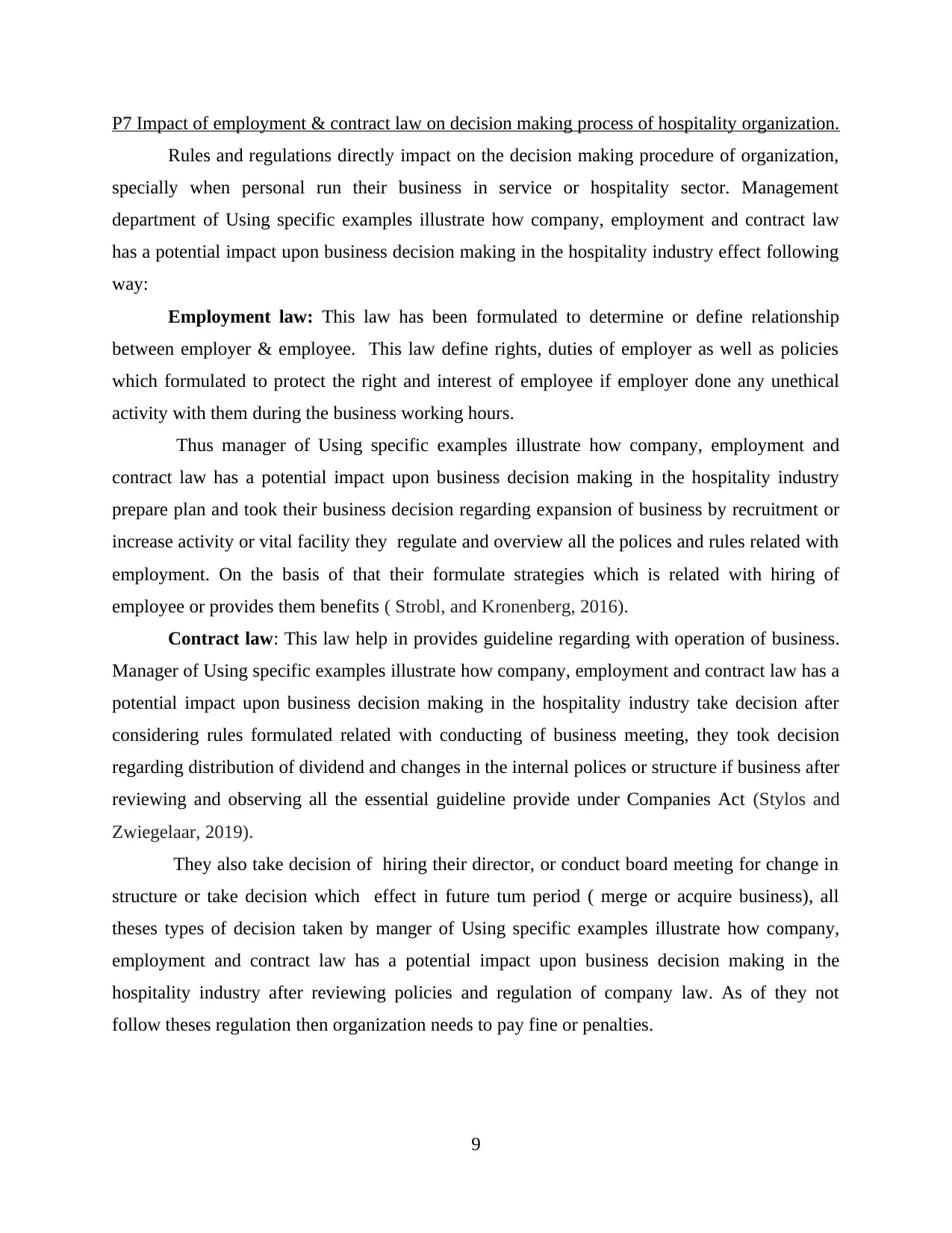
P7 Impact of employment & contract law on decision making process of hospitality organization.
Rules and regulations directly impact on the decision making procedure of organization,
specially when personal run their business in service or hospitality sector. Management
department of Using specific examples illustrate how company, employment and contract law
has a potential impact upon business decision making in the hospitality industry effect following
way:
Employment law: This law has been formulated to determine or define relationship
between employer & employee. This law define rights, duties of employer as well as policies
which formulated to protect the right and interest of employee if employer done any unethical
activity with them during the business working hours.
Thus manager of Using specific examples illustrate how company, employment and
contract law has a potential impact upon business decision making in the hospitality industry
prepare plan and took their business decision regarding expansion of business by recruitment or
increase activity or vital facility they regulate and overview all the polices and rules related with
employment. On the basis of that their formulate strategies which is related with hiring of
employee or provides them benefits ( Strobl, and Kronenberg, 2016).
Contract law: This law help in provides guideline regarding with operation of business.
Manager of Using specific examples illustrate how company, employment and contract law has a
potential impact upon business decision making in the hospitality industry take decision after
considering rules formulated related with conducting of business meeting, they took decision
regarding distribution of dividend and changes in the internal polices or structure if business after
reviewing and observing all the essential guideline provide under Companies Act (Stylos and
Zwiegelaar, 2019).
They also take decision of hiring their director, or conduct board meeting for change in
structure or take decision which effect in future tum period ( merge or acquire business), all
theses types of decision taken by manger of Using specific examples illustrate how company,
employment and contract law has a potential impact upon business decision making in the
hospitality industry after reviewing policies and regulation of company law. As of they not
follow theses regulation then organization needs to pay fine or penalties.
9
Rules and regulations directly impact on the decision making procedure of organization,
specially when personal run their business in service or hospitality sector. Management
department of Using specific examples illustrate how company, employment and contract law
has a potential impact upon business decision making in the hospitality industry effect following
way:
Employment law: This law has been formulated to determine or define relationship
between employer & employee. This law define rights, duties of employer as well as policies
which formulated to protect the right and interest of employee if employer done any unethical
activity with them during the business working hours.
Thus manager of Using specific examples illustrate how company, employment and
contract law has a potential impact upon business decision making in the hospitality industry
prepare plan and took their business decision regarding expansion of business by recruitment or
increase activity or vital facility they regulate and overview all the polices and rules related with
employment. On the basis of that their formulate strategies which is related with hiring of
employee or provides them benefits ( Strobl, and Kronenberg, 2016).
Contract law: This law help in provides guideline regarding with operation of business.
Manager of Using specific examples illustrate how company, employment and contract law has a
potential impact upon business decision making in the hospitality industry take decision after
considering rules formulated related with conducting of business meeting, they took decision
regarding distribution of dividend and changes in the internal polices or structure if business after
reviewing and observing all the essential guideline provide under Companies Act (Stylos and
Zwiegelaar, 2019).
They also take decision of hiring their director, or conduct board meeting for change in
structure or take decision which effect in future tum period ( merge or acquire business), all
theses types of decision taken by manger of Using specific examples illustrate how company,
employment and contract law has a potential impact upon business decision making in the
hospitality industry after reviewing policies and regulation of company law. As of they not
follow theses regulation then organization needs to pay fine or penalties.
9
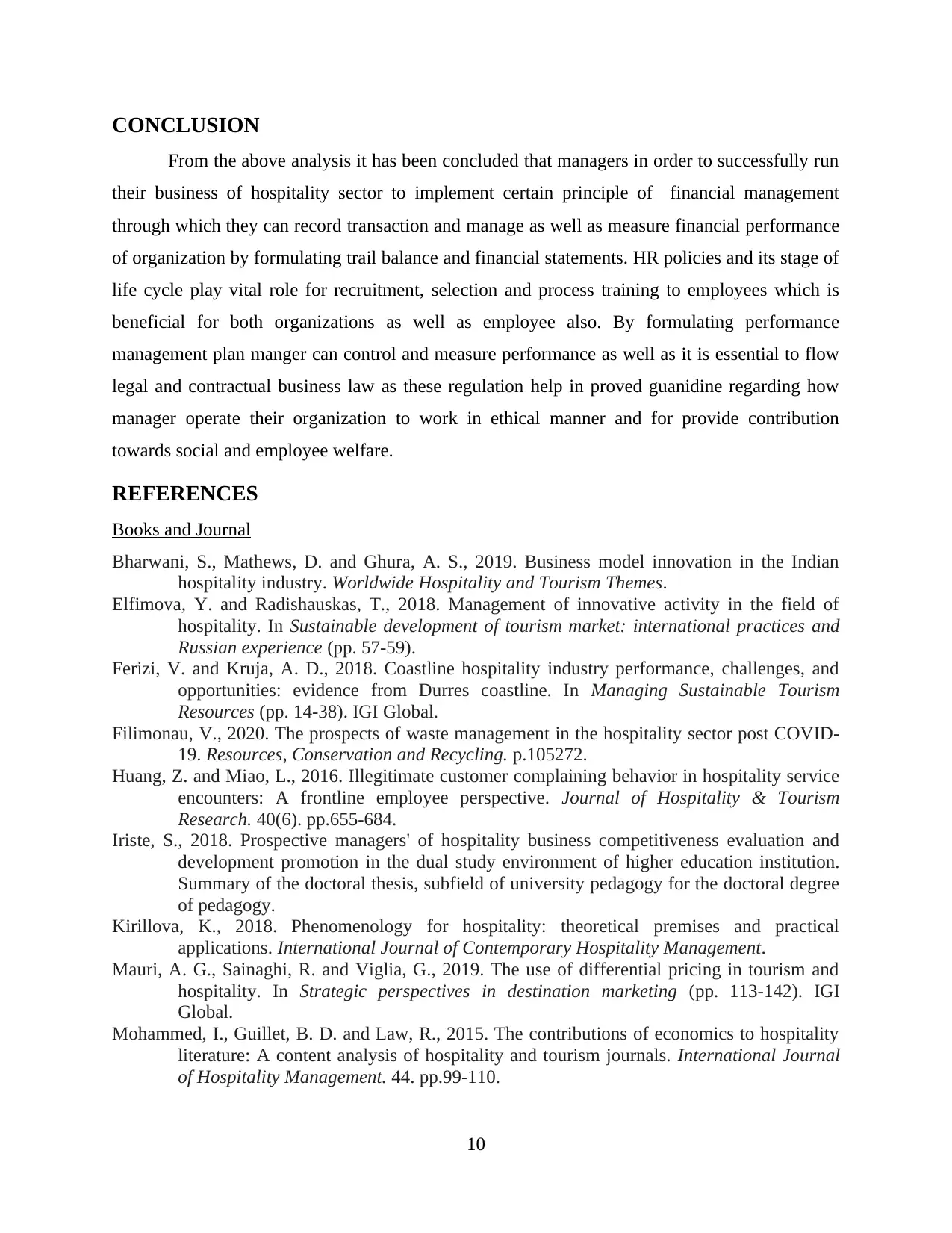
CONCLUSION
From the above analysis it has been concluded that managers in order to successfully run
their business of hospitality sector to implement certain principle of financial management
through which they can record transaction and manage as well as measure financial performance
of organization by formulating trail balance and financial statements. HR policies and its stage of
life cycle play vital role for recruitment, selection and process training to employees which is
beneficial for both organizations as well as employee also. By formulating performance
management plan manger can control and measure performance as well as it is essential to flow
legal and contractual business law as these regulation help in proved guanidine regarding how
manager operate their organization to work in ethical manner and for provide contribution
towards social and employee welfare.
REFERENCES
Books and Journal
Bharwani, S., Mathews, D. and Ghura, A. S., 2019. Business model innovation in the Indian
hospitality industry. Worldwide Hospitality and Tourism Themes.
Elfimova, Y. and Radishauskas, T., 2018. Management of innovative activity in the field of
hospitality. In Sustainable development of tourism market: international practices and
Russian experience (pp. 57-59).
Ferizi, V. and Kruja, A. D., 2018. Coastline hospitality industry performance, challenges, and
opportunities: evidence from Durres coastline. In Managing Sustainable Tourism
Resources (pp. 14-38). IGI Global.
Filimonau, V., 2020. The prospects of waste management in the hospitality sector post COVID-
19. Resources, Conservation and Recycling. p.105272.
Huang, Z. and Miao, L., 2016. Illegitimate customer complaining behavior in hospitality service
encounters: A frontline employee perspective. Journal of Hospitality & Tourism
Research. 40(6). pp.655-684.
Iriste, S., 2018. Prospective managers' of hospitality business competitiveness evaluation and
development promotion in the dual study environment of higher education institution.
Summary of the doctoral thesis, subfield of university pedagogy for the doctoral degree
of pedagogy.
Kirillova, K., 2018. Phenomenology for hospitality: theoretical premises and practical
applications. International Journal of Contemporary Hospitality Management.
Mauri, A. G., Sainaghi, R. and Viglia, G., 2019. The use of differential pricing in tourism and
hospitality. In Strategic perspectives in destination marketing (pp. 113-142). IGI
Global.
Mohammed, I., Guillet, B. D. and Law, R., 2015. The contributions of economics to hospitality
literature: A content analysis of hospitality and tourism journals. International Journal
of Hospitality Management. 44. pp.99-110.
10
From the above analysis it has been concluded that managers in order to successfully run
their business of hospitality sector to implement certain principle of financial management
through which they can record transaction and manage as well as measure financial performance
of organization by formulating trail balance and financial statements. HR policies and its stage of
life cycle play vital role for recruitment, selection and process training to employees which is
beneficial for both organizations as well as employee also. By formulating performance
management plan manger can control and measure performance as well as it is essential to flow
legal and contractual business law as these regulation help in proved guanidine regarding how
manager operate their organization to work in ethical manner and for provide contribution
towards social and employee welfare.
REFERENCES
Books and Journal
Bharwani, S., Mathews, D. and Ghura, A. S., 2019. Business model innovation in the Indian
hospitality industry. Worldwide Hospitality and Tourism Themes.
Elfimova, Y. and Radishauskas, T., 2018. Management of innovative activity in the field of
hospitality. In Sustainable development of tourism market: international practices and
Russian experience (pp. 57-59).
Ferizi, V. and Kruja, A. D., 2018. Coastline hospitality industry performance, challenges, and
opportunities: evidence from Durres coastline. In Managing Sustainable Tourism
Resources (pp. 14-38). IGI Global.
Filimonau, V., 2020. The prospects of waste management in the hospitality sector post COVID-
19. Resources, Conservation and Recycling. p.105272.
Huang, Z. and Miao, L., 2016. Illegitimate customer complaining behavior in hospitality service
encounters: A frontline employee perspective. Journal of Hospitality & Tourism
Research. 40(6). pp.655-684.
Iriste, S., 2018. Prospective managers' of hospitality business competitiveness evaluation and
development promotion in the dual study environment of higher education institution.
Summary of the doctoral thesis, subfield of university pedagogy for the doctoral degree
of pedagogy.
Kirillova, K., 2018. Phenomenology for hospitality: theoretical premises and practical
applications. International Journal of Contemporary Hospitality Management.
Mauri, A. G., Sainaghi, R. and Viglia, G., 2019. The use of differential pricing in tourism and
hospitality. In Strategic perspectives in destination marketing (pp. 113-142). IGI
Global.
Mohammed, I., Guillet, B. D. and Law, R., 2015. The contributions of economics to hospitality
literature: A content analysis of hospitality and tourism journals. International Journal
of Hospitality Management. 44. pp.99-110.
10
⊘ This is a preview!⊘
Do you want full access?
Subscribe today to unlock all pages.

Trusted by 1+ million students worldwide
1 out of 15
Related Documents
Your All-in-One AI-Powered Toolkit for Academic Success.
+13062052269
info@desklib.com
Available 24*7 on WhatsApp / Email
![[object Object]](/_next/static/media/star-bottom.7253800d.svg)
Unlock your academic potential
Copyright © 2020–2026 A2Z Services. All Rights Reserved. Developed and managed by ZUCOL.





